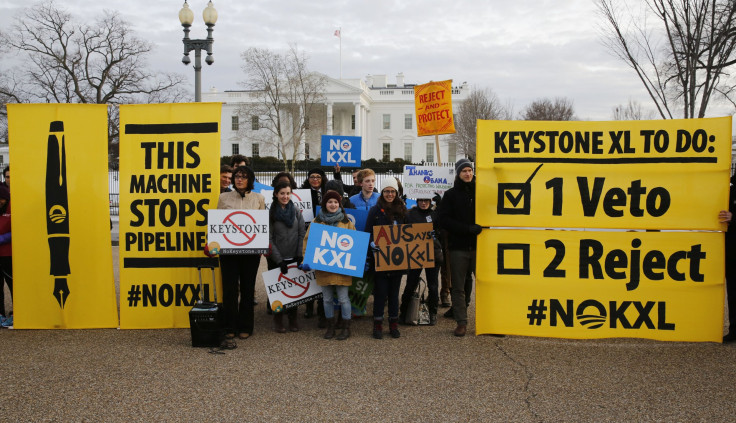Obama Vetoes Canada Keystone Oil Pipeline, Gets Caught Up In US Politics Web

U.S. President Barack Obama has formally vetoed on Tuesday the bill that would have allowed the construction of the much-delayed Canada Keystone XL oil pipeline project. Although it been told many times that the project is being hindered because it somehow contradicts Mr Obama’s policies on the environment and climate change, many believed the project is caught in the web that is the American politics.
"He's looking at this as showing he still can be king of the hill, because we don't have the votes to override," Republican Sen. Jim Inhofe of Oklahoma told AP. Inhofe is one of Mr Obama’s vocal opponents against his climate change agenda. In limbo for over six years now, the Keystone XL oil pipeline project cannot push through because it needs the approval of the U.S. federal government since it would cross borders from Alberta, Canada to its closest ally’s Texas state.
The Keystone XL oil pipeline project legislation was passed by the U.S. House on Feb 11, then by the Senate two weeks after. But Mr Obama, in his veto message, said he is not attaching his signature to the measure because it “conflicts with established executive branch procedures and cuts short thorough consideration of issues that could bear on our national interest -- including our security, safety, and environment."
Washington had long expressed that proponents of the Keystone XL oil pipeline project wait for the results of an ongoing process being carried out by the U.S. Department of State. The latter is expected to come out with a decision in the coming weeks. Although more than 60 percent of Americans okayed the Keystone XL pipeline, the White House said everyone must wait for the decision of the U.S. Department of State since it is the only one that can decide whether to grant the project a permit or not.
Gary Doer, Canada’s ambassador to the U.S., expects the Keystone XL debate to become a recurring thing in the U.S. domestic political debate, one that could experience a “roller-coaster” momentum with “setbacks.” To prevent such scenario, former New York mayor Michael Bloomberg who is now a United Nations special envoy on climate change, suggested it might be best that Canada and the U.S. strike a bilateral climate deal with regards to the Keystone XL oil pipeline project.
“The endless partisan debate over the Keystone XL pipeline has gotten us nowhere. Instead of continuing to argue among ourselves, it would be far more productive to engage our friends north of the border,” Bloomberg wrote in the portal centredaily.com. “I encourage President Obama and Prime Minister Stephen Harper to engage in talks that can lead to an agreement that will benefit both our nations’ economies and environments.”
The 1,200-mile Keystone XL pipeline is forecast to carry 800,000 barrels of Canadian oil a day through the U.S. for possible export. Actually, “contrary to conventional wisdom, the Keystone pipeline could open up a rare opportunity to achieve progress on climate change,” Bloomberg added.
To report problems or to leave feedback about this article, e-mail: e.misa@ibtimes.com.au.





















